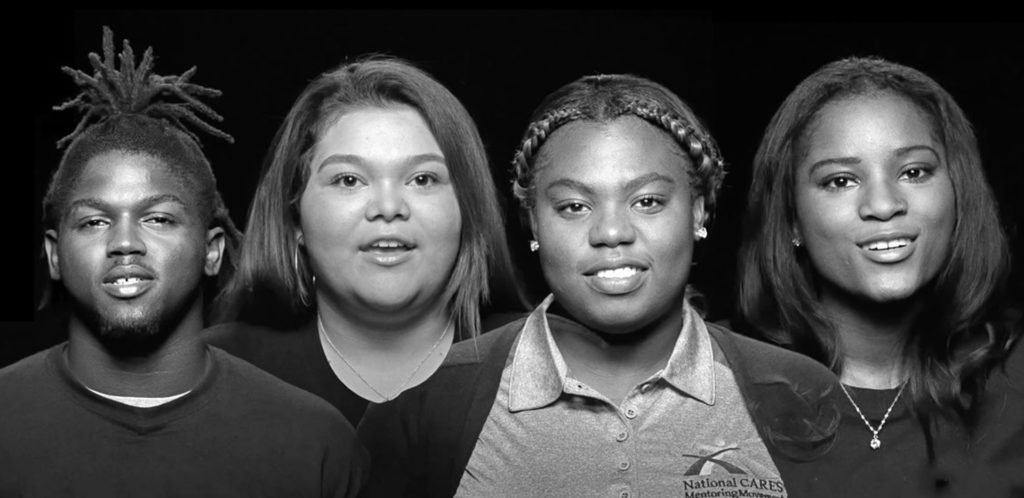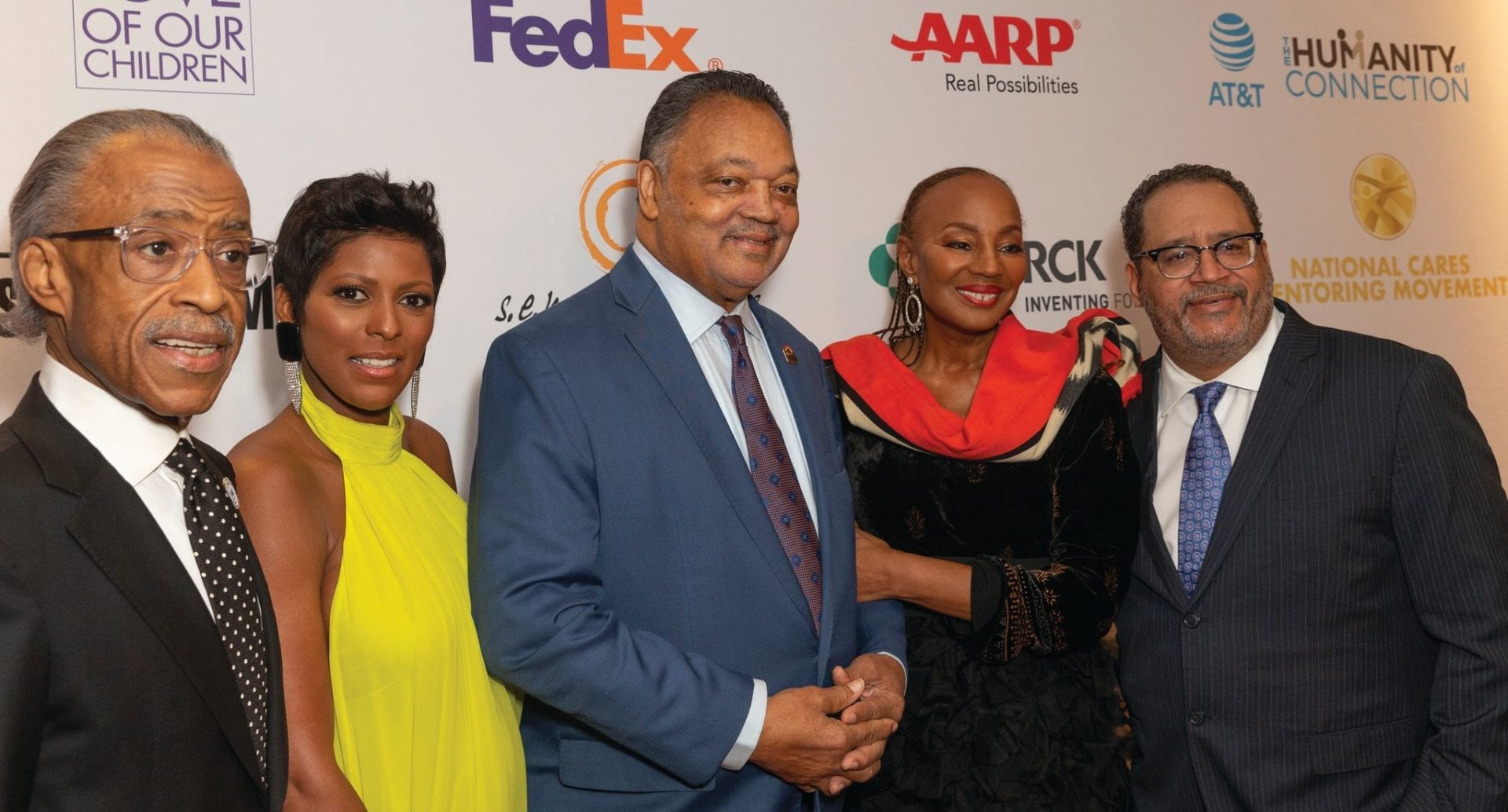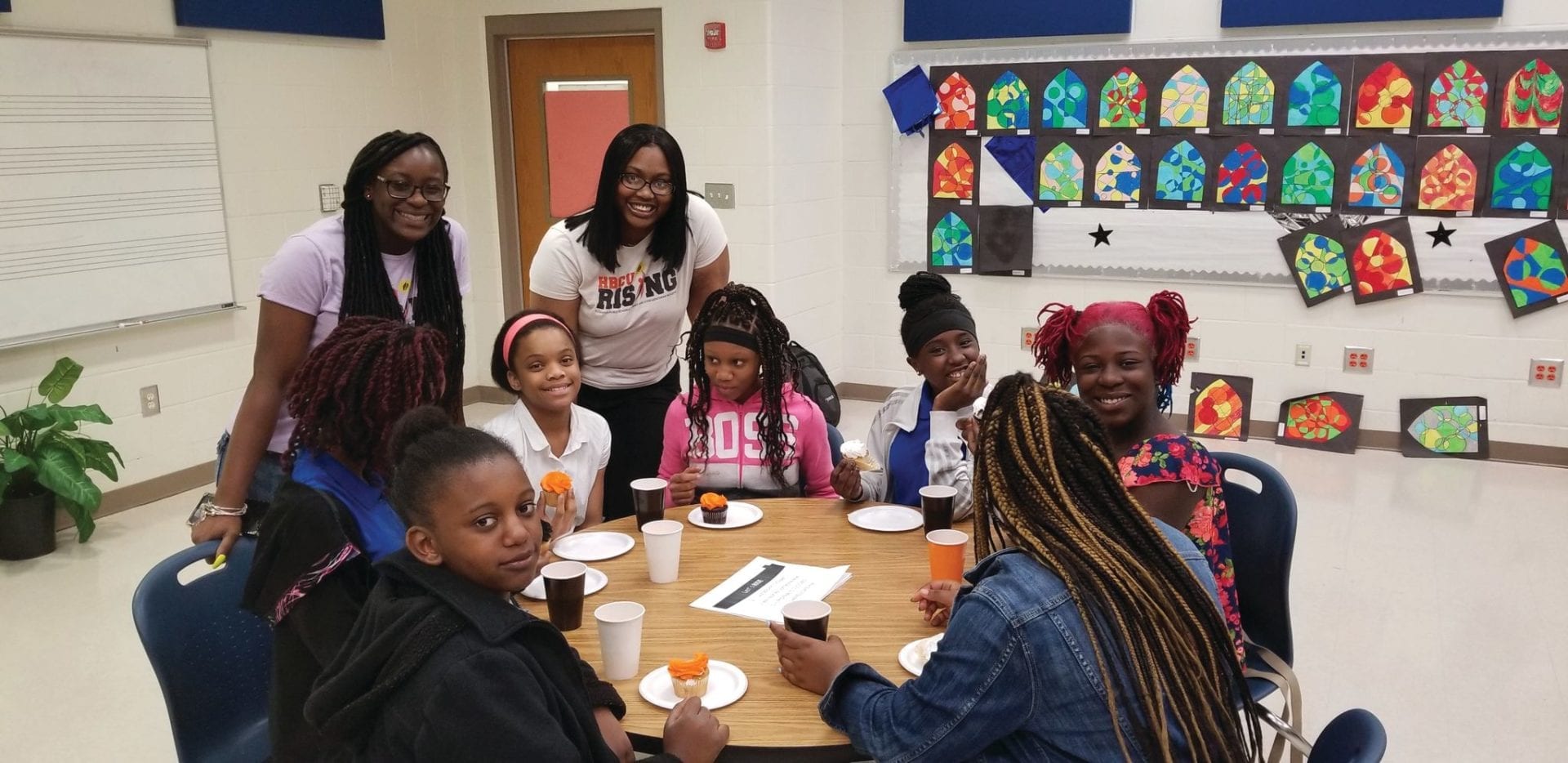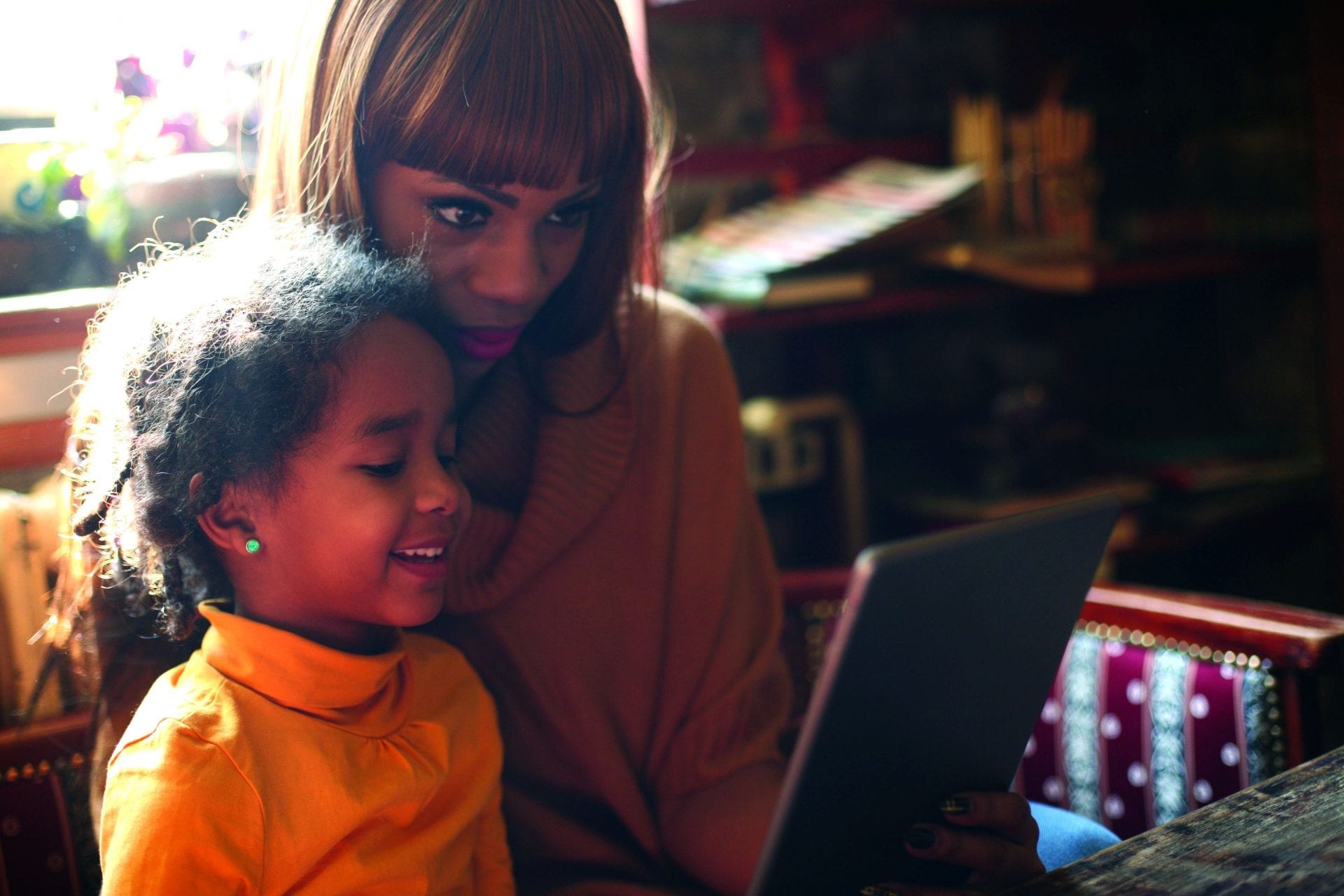With the fourth annual For The Love Of Our Children Gala on the horizon, we look back at over a decade’s worth of work shaping the future of children in need.
It is almost 2 am when Simone’s cell phone rings—the electronic’s powerful vibrations break her slumber, and the blue light it emits rouses her. On the other end of the phone is Marchae, her mentee. A senior in high school, she has a lot going on—her family dynamic is changing, she’s trying to navigate college decisions, schoolwork just keeps getting more challenging, and her part-time job keeps demanding more of her energy. Sometimes it’s all too much, and when things get that way, the teenager calls her mentor. Marchae knows she can call Simone when she’s in trouble or just needs someone willing to listen to her side of the story.
Both natives of Chicago who had quite a bit in common, the pairing got off to a rocky start. When they were placed together, Marchae’s freshman year, she saw Simone as “just another teacher” and decided she had enough of those already. Simone admits it took time to earn Marchae’s trust but insists she saw something special in her mentee from day one: “She was easily distracted and didn’t want to be bothered. But I knew she had a lot of potential because she was a leader from the moment I met her. She was able to get the rest of the students to follow directions.”
They see each other at least twice a week, and rarely does a day go by that they don’t communicate—sometimes it’s just a check in, other days set aside structured time to do some problem solving. Marchae is now a senior and applying to college. Because of the work Simone helped her do earlier in her high school career, Marchae isn’t worried about being accepted, but rather choosing where she can go, and making sure the scholarships Simone helped her apply for will cover the costs.
The pair met through the National CARES Mentoring affiliate program in Chicago. Founded by Susan L. Taylor, Editor-in-Chief Emerita of Essence Magazine, the nonprofit’s mission is to galvanize the communities, instilling hope, critical thinking skills, racial pride and a love for learning and wellness in mind, body and spirit in every participant.
 Image courtesy of caresmentoring.org
Image courtesy of caresmentoring.org
The organization’s structure blossomed out of the needs that Susan saw when she curated the magazine’s annual summer shindig. Essence Festival began in 1995. Dubbed “the party with a purpose,” the event has always had a philanthropic bent, and its focus on uplifting its attendees led it to become the largest event celebrating African-American culture and music in the United States. Held annually in New Orleans, the devastation of Hurricane Katrina forced Taylor to think about the people of the city and the impact the disaster had upon the Black community. People were out of work and desperately trying to hold onto their homes, and the struggle of the city’s children was on display: without stability, they were doing what it took to survive, like joining gangs and engaging in transactional activities.
The statistics are daunting: according to the latest U.S. Census Bureau data, 29 percent of Black children live in poverty, a number higher than any other ethnic group. Black children are most likely to be living in “deep poverty,” defined as a family of four subsisting on half of the federal poverty limit, approximately $12,429 per year.
“African American children on average have two additional adverse childhood experiences than any other racial group.” Kerri Osborne, the Chief Development Officer for CARES, explains. “What that does is create trauma and toxic stress. There is research that shows that (these experiences) affect brain development, and that impacts your ability to make decisions and understand consequences.”
The experiences that Osborne mentions include frequent socioeconomic hardship, parental divorce or separation, parental death, parental incarceration, family violence, neighborhood violence, living with someone who was mentally ill or suicidal, living with someone who had a substance abuse problem or racial discrimination.
According to the ACLU, 14 million students are in schools with police officers but no counselors, nurses, psychologists or social workers, and the lack of school mental health staff is harming students. This school-to-prison pipeline mentality, combined with under-resourced schools and overwhelmed adults, can derail a child’s future. The problems start early: by age two, disparities in development skills between Black and White children are evident, with fewer Black children demonstrating proficiency indicators such as receptive vocabulary, expressive vocabulary, matching, early counting, math, color knowledge, numbers and shapes.

Left to right: Al Sharpton, Tamron Hall, Jesse Jackson, Susan Taylor and Michael Eric Dyson attend the 2019 For the Love of Our Children Gala by National CARES Mentoring Movement Gala at Ziegfeld Ballroom in New York, New York. LEV RADIN / SHUTTERSTOCK.COM
According to the U.S. Department of Education Office for Civil Rights, Black children are disproportionally disciplined and suspended—although they represent 18 percent of preschool enrollment, they are 42 percent of preschool students who are suspended once, and 48 percent of students suspended more than once. Studies find that third grade reading levels are predictive of high school graduation, with one in six children who are not reading proficiently not graduating from high school on time, and that socioeconomic status is one of the biggest factors for high school graduation rates. For a large number of American schoolchildren, the factors they’re facing seem insurmountable.
“We don’t expect a bird with a broken wing to fly, but we expect children with very deep emotional wounds to perform like children who don’t have those,” says Osborne. “We see these children achieve so many of the goals set for them once they’ve had a chance to talk about the hurts they’ve endured and learned new strategies on how to cope and how to flourish.”
In order to combat some of this trauma and with the hope of creating a safe place for reflection and connection, CARES launched Community Wellness and Wealth-Building Circles in 2018. A series of healing gatherings, facilitators pair stress-management techniques with stories of what African Americans have survived and achieved, create a sense of pride in participants’ Black heritage.
Taylor understood that the plight of New Orleans was made more visible after the hurricane, but the dynamics at play made life untenable for children all over the country. In response, she and the rest of the magazine’s editorial team created a program called Essence CARES, with the intention of pairing vulnerable youth with adults who could guide and support them as they went through life’s transitions. The organization learned that one-on-one mentoring was effective, but there was often a shortage of adults willing to be mentors.
The team went back to the drawing board and came up with two ways to solve the problem. The first was to recruit adults who need a push to become a mentor and create programming that gives them the support they need. The second was to shift to a group mentoring program, in which an adult mentor could spend time facilitating discussions with a group of youth while getting to know them better. The organization rolled out the idea in several cities all over the country. Eventually, Taylor shifted her attention from running the magazine to supporting the nonprofit full-time, and the project was renamed National CARES Mentoring Movement. The nonprofit now has five different levels of programming to help youth in different stages of their lives. CARES utilizes a culturally specific curriculum that affirms and emphasizes a participant’s humanity, resilience and ancestry. The type of programming that CARES implements helps attendees focus on overcoming internal and external barriers to self-sufficiency and emphasizes the benefits of a healthy, high-quality life within a community. There are lessons on workforce readiness, conflict-resolution, economic independence and civic engagement.

In an effort to overcome barriers to success resulting from the trauma-causing impacts of poverty, National CARES Mentoring Movement pairs vulnerable youth with adults to provide social, emotional and academic support.
Simone got involved with National CARES Mentoring Movement because of the impact her high school and college mentor had on her life. When she was in high school, a woman named Mrs. Bannister was her mentor. “All of the things that my family could not give me, Mrs. Bannister did. Her entire family took me under their wing and gave me culture and opened my eyes to the things I could obtain outside of working at places like TJ Maxx and being on public assistance,” she explains. “At the time, I had a child, and she loved on my child too. Her family took me wherever they went. Mrs. Bannister taught me about style and life. She was my mentor for eight years.”
Simone does her best to be that type of anchor for Marchae. “The support at home is nothing like what I have with Ms. Simone,” Marchae explains. “My mom has her own thing going on, and she’s living her life right now. My dad— he’s there, but this is his first opportunity at being a real dad. I never lived with him or spent time around him, and he mostly contributed financially.” Having an adult willing to come to her volleyball games and National Honor Society induction made her happy to celebrate her accomplishments.
When teens like Marchae reach adulthood, they have all of the tools they need to become a mentor to another youth in need of guidance. The organization’s pipeline program appears to be working: Marchae is already well on her way to becoming a mentor. As she walks the hallways of her high school, she encourages freshmen she encounters, and she often gives her younger sister the same words of wisdom Simone gave her: don’t make excuses. Marchae will graduate in 2020. She knows Simone will be in the auditorium that day, cheering her on.
Stories like Simone and Marchae’s will be highlighted at the organization’s fourth annual For The Love Of Our Children Gala, which will take place on Monday, February 10th, 2020 at Cipriani Wall Street. The event raises critical funds for the organization’s life-changing work with young people in need. This year’s honoree is Robert F. Smith, a chemical engineer whose work as a philanthropist led him to found Vista Equity Partners, which he now serves as CEO. Smith recently made In an effort to overcome barriers to success resulting from the trauma-causing impacts of poverty, National CARES Mentoring Movement pairs vulnerable youth with adults to provide social, emotional and academic support. the news when he changed the lives of some Morehouse College graduates. At their commencement, he announced his intention to pay off the entire student loan debt of the 2019 graduating class, breaking the cycle of debt bondage college graduates often find themselves in. More information about the event can be found at caresmentoring.org/gala/.

